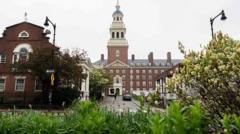The fifth anniversary of George Floyd's death is marked by memorials and events in both Houston and Minneapolis, where his tragic murder reignited the movement against police brutality. Despite initial gains in reform, recent political shifts under the Trump administration have raised concerns about the future of racial justice initiatives.
Commemorating George Floyd: Reflections on Five Years of Activism and Setbacks

Commemorating George Floyd: Reflections on Five Years of Activism and Setbacks
As America remembers George Floyd five years after his death, a complex landscape of activism and political changes emerges, highlighting both progress and challenges in the fight against systemic racism.
As Americans commemorated the fifth anniversary of George Floyd's death, various memorials unfolded across the nation, particularly in his hometown of Houston and the city of Minneapolis, where he was tragically killed. Family members, along with community friends, attended gatherings that paid tribute to Floyd, whose murder by police officer Derek Chauvin in 2020 ignited widespread protests against systemic racism and police violence.
In Houston, a weekend event led by Rev. Al Sharpton attracted Floyd's family and others, while in Minneapolis, organized events included a church service, candlelight vigil, and an evening concert as part of the Rise and Remember Festival. Floyd's aunt, Angela Harrelson, reiterated the call for continued activism, stating, "Now is the time for the people to rise up and continue the good work we started."
George Floyd died during a police arrest when Chauvin knelt on his neck for over nine minutes, a horrific act captured on a cellphone video that sparked protests worldwide, confronting deep-rooted racism and police brutality. Chauvin was sentenced to 22 years in prison for murder, and other officers were held accountable for their inaction during the incident. In light of Floyd's death, the Justice Department had launched investigations into various police agencies, including those in Minneapolis and Louisville, aiming to address systemic failures.
However, the momentum for reform appears to be waning as political sentiments shift. The Trump administration recently criticized existing reform agreements as flawed and restrictive to police operations, signaling a potential rollback in changes made under the Biden administration. Minneapolis Mayor Jacob Frey stated that the city would continue to comply with their consent decree, emphasizing ongoing commitment amid federal pushback.
In Washington, significant actions have also taken place, such as the removal of Black Lives Matter Plaza near the White House and the demolition of a mural honoring Floyd in Houston. Meanwhile, recent polls indicate that public support for the Black Lives Matter movement has decreased, with a substantial majority believing that little has improved in the lives of Black individuals since Floyd’s death.
As communities gather in remembrance, they confront a mixed landscape of achievements and obstacles in the quest for true justice, equality, and systemic change.




















